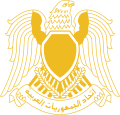Coat of arms of the Syrian opposition
| Coat of arms of the Syrian Opposition | |
|---|---|
| Armiger | Syrian Interim Government Syrian National Coalition |
| Adopted | 2012 |
| Shield | Per pale Gules, Argent and Sable, two Mullets of five points palewise Rouge |
| Supporters | A grey Hawk of Quraish |
The Syrian Interim Government, a provisional government for Opposition-held parts of Syria, uses a modified version of the Hawk of Quraish with the colors of the Syrian independence flag.
The Syrian National Coalition uses the Pan-Arab colors of a five-pointed star with the words in Arabic on the bottom: National Coalition for Syrian Revolutionary and Opposition Forces. (Arabic: الائتلاف الوطني لقوى الثورة والمعارضة السورية).
History
Since the declaration of the Syrian Republic on 14 May 1930, Syria has had several coats of arms, albeit fairly consistent in composition - a supporter (often the Hawk of Quraish) bearing a shield, with the official Arabic name of the territory on a scroll beneath.
During Syria's union with Egypt in the United Arab Republic (UAR) between 1958 and 1961, the pan-Arab Eagle of Saladin was used as the basis of the coat of arms. Though Syria withdrew from the union in 1961, Egypt continued to use the official name, flag, and coat of arms of the UAR until 1971. Syria reverted to the coat of arms used before the UAR, inverting the colours of the mullets and the orle two years later.
During the period of the Federation of Arab Republics between 1972 and 1977, a loose association of Egypt, Libya, and Syria, the Hawk of Quraish was used as the coat of arms.
After the end of the union, all three former member states retained the Hawk of Quraish. Egypt finally reverted to the Eagle of Saladin in 1984, which had served as the coat of arms of both Egypt and Libya prior to the abortive union, and which still serves as the basis of the arms of Egypt, Iraq, and Palestine. Syria continued to use the Hawk of Quraish, as did Libya under Gaddafi (although the Libyan version faced to the dexter rather than to the sinister, as in the Syrian version).
 |
|---|
-
Coat of arms of the Syrian Republic (1946–1958)
-
Coat of arms of the United Arab Republic (1958–1961)
-
Coat of arms of the Syrian Republic (1961–1964)
-
Coat of arms of the Syrian Republic (1964–1972)
-
Coat of arms of the Federation of Arab Republics (1972–1980)
-
Coat of arms of Syria (1980–present)





